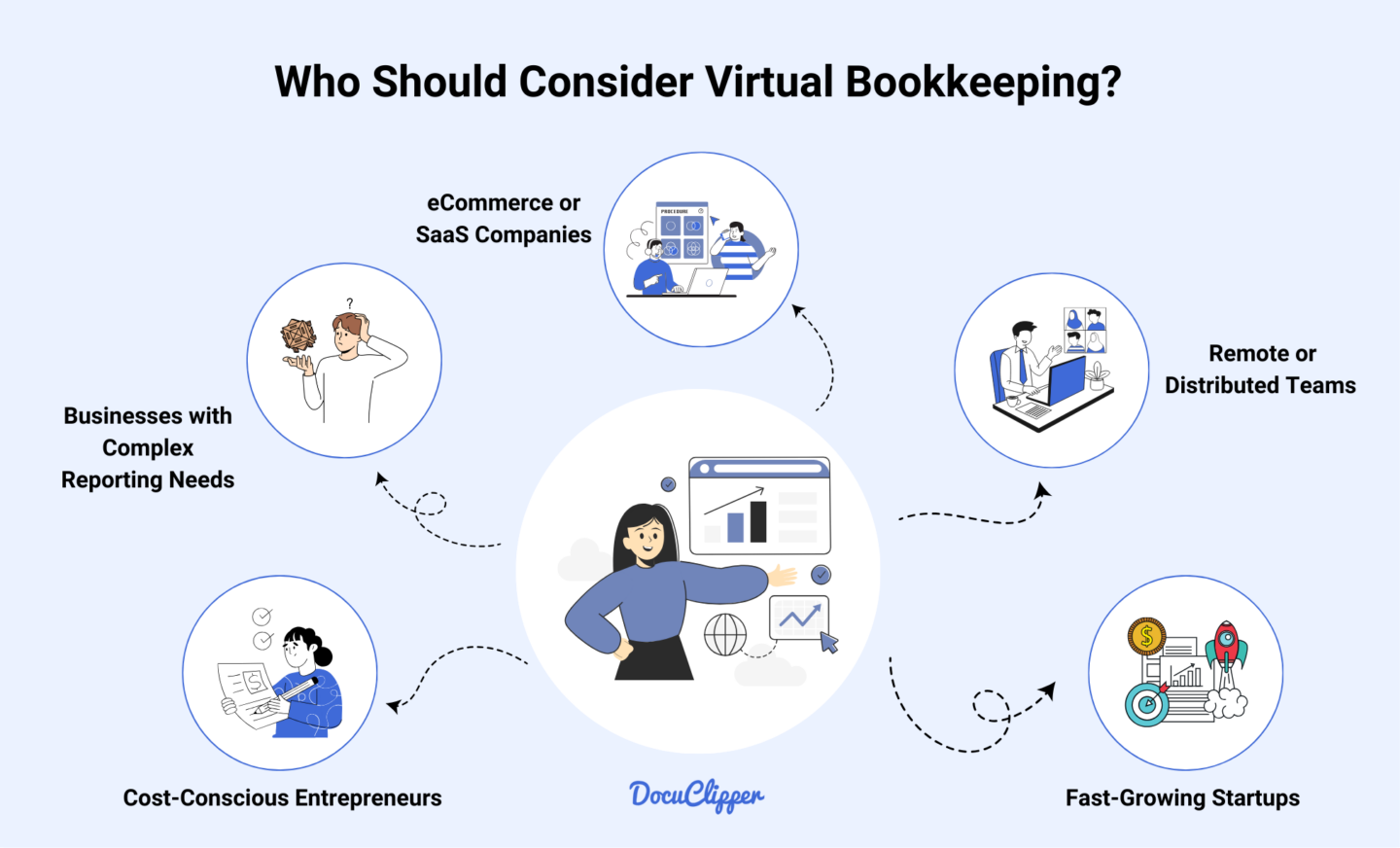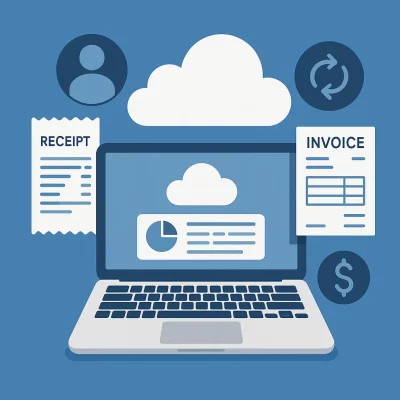Key Takeaways:
- Virtual bookkeeping is a modern, flexible solution for managing your business’s financial records online using cloud-based software—no in-house team required.
- You can outsource data entry and routine bookkeeping tasks to remote professionals, saving time and cutting costs while improving accuracy and compliance.
- Hiring a virtual bookkeeper gives you access to broader expertise, scalable support, and faster reporting—ideal for startups and growing businesses.
- The virtual bookkeeping process is simple and efficient, involving cloud setup, document uploads, data categorization, reconciliation, and regular financial reporting.
- Businesses with complex needs or multiple locations benefit most, especially those in fast-moving industries like SaaS, eCommerce, and crypto.
- Choosing the right provider means evaluating experience, services, tech stack, support, and pricing, so you get the best fit for your financial goals and workflow.
What is Virtual Bookkeeping?
Virtual bookkeeping is the process of managing your business’s financial records remotely using cloud-based accounting software.
Instead of having someone on-site, you or a hired expert handle tasks like recording transactions, categorizing expenses, and preparing basic financial reports—all online.
This approach gives you greater flexibility, faster access to reports, and the ability to work with professionals regardless of location. You don’t need to maintain an in-house team, which cuts overhead and lets you scale more easily.
While the term “bookkeeping” can include everything from simple data entry to financial analysis, virtual bookkeeping usually focuses on the routine, day-to-day tasks needed to keep your books accurate and up to date. Whether you outsource it to a freelancer or a full-service firm, it’s a modern solution built for how businesses operate today.
Why Hire a Virtual Bookkeeper?
Virtual bookkeeping offers more than just convenience—it’s a strategic move that saves time, reduces costs, and gives you better financial insights. Here’s why more businesses are going virtual:
- Save Time and Reduce Stress: Managing your books manually or in-house can consume hours every week—time you could be spending growing your business. According to a SCORE report, 40% of small business owners say bookkeeping and taxes are the most stressful part of running a business. Delegating this work to a virtual bookkeeper frees you from daily financial tasks so you can focus on what matters most.
- Lower Your Operating Costs: Hiring and training an in-house bookkeeper involves salaries, benefits, office space, and software. In contrast, outsourcing virtual bookkeeping can cut those costs by up to 30 – 40%, as reported by The Hackett Group. With virtual services, you only pay for what you need—no overhead, no long-term contracts.
- Tap Into Broader Expertise: A virtual bookkeeping service provides access to professionals with experience across different industries and software platforms. Instead of relying on one generalist, you work with people who understand your unique financial workflows and compliance requirements. This is especially helpful if you operate in a niche market or need industry-specific support.
- Scale Effortlessly as You Grow: As your business expands, so does the complexity of your finances. A virtual bookkeeper can grow with you—taking on more work during tax season, adding payroll support, or helping with financial projections. Unlike in-house hires, outsourced bookkeeping services scale quickly and without the friction of recruiting or training.
- Focus on Strategy, Not Spreadsheets: When you’re not buried in receipts, reconciliations, and spreadsheets, you can spend more time analyzing trends, serving customers, and making smart decisions. Virtual bookkeepers can even provide real-time dashboards and reports, helping you stay on top of your business health without lifting a finger.
How Does Virtual Bookkeeping Work?

Virtual bookkeeping simplifies the way you manage finances by handling everything online through cloud-based tools. Here’s how the process typically works:
- Initial Setup: You and your virtual bookkeeper choose a cloud-based accounting platform (like QuickBooks Online, Xero, or Sage). The bookkeeper sets up your chart of accounts, user permissions, and secure document-sharing channels.
- Document Uploads: You upload receipts, invoices, bank statements, and other financial documents directly into the platform or a secure client portal.
- Data Entry and Categorization: The bookkeeper records your transactions, categorizes expenses and income, and ensures everything is properly tagged for reporting and tax purposes.
- Account Reconciliation: Bank and credit card transactions are matched and reconciled with your records to ensure accuracy and catch any discrepancies.
- Reporting and Communication: Monthly reports—like profit & loss statements, balance sheets, and cash flow summaries—are prepared and shared with you. You stay in touch with your bookkeeper via email, phone, or video calls to discuss results or flag anything unusual.
Who Should Consider Virtual Bookkeeping?

If you’re looking for a more flexible, cost-effective way to manage your business finances, virtual bookkeeping is worth considering. It’s especially useful if your team is comfortable working online and prefers streamlined, remote collaboration.
Fast-growing startups benefit the most—especially when the volume of transactions begins to outpace your internal capacity. Instead of hiring and training multiple in-house bookkeepers, you can bring in a remote team that scales with your needs.
If your business operates across several locations or deals with complex reporting—such as eCommerce, crypto, or SaaS—you’ll also find virtual bookkeeping helpful. You get access to industry-specific expertise without being limited by geography.
It’s easier to stay compliant and generate accurate reports, even when you’re working with unfamiliar tax structures or funding requirements.
Whether you’re bootstrapping or venture-backed, virtual bookkeeping gives you the insight and support you need without the overhead of a traditional accounting team.
How to Choose a Virtual Bookkeeping Service
Virtual bookkeeping can be a game-changer—if you choose the right provider. Here are six key things to look for when making your decision:
- Industry Experience: Choose a provider familiar with your industry’s financial needs, reporting standards, and compliance obligations. Whether you’re in SaaS, eCommerce, or professional services, specialized knowledge helps prevent errors and improves efficiency.
- Service Offerings: Look beyond basic bookkeeping. A strong provider should offer additional services like payroll, invoicing, financial reporting, and tax support—so you don’t have to juggle multiple vendors as your needs grow.
- Reputation and Reviews: Research online reviews, ask for referrals, and look for case studies. A well-reviewed bookkeeping service signals consistency, professionalism, and client satisfaction.
- Technology Integration: Ensure the provider uses modern, cloud-based accounting tools like QuickBooks Online, Xero, or DocuClipper. Strong tech integration means faster processing, better data accuracy, and real-time access to your financials.
- Communication and Support: Look for fast, reliable communication. A dedicated point of contact who responds promptly to questions or concerns makes the entire bookkeeping process smoother.
- Scalability and Pricing: Pick a service that fits your budget now but can also scale as you grow. The right provider should offer flexible pricing and have the capacity to support your evolving needs.
Best Virtual Bookkeeping Software
Choosing the right software can make your virtual bookkeeping process faster, more accurate, and easier to manage. Here are some of the best tools to consider:
- DocuClipper: If you’re dealing with scanned receipts, invoices, or bank statements, DocuClipper automates data entry using OCR. You can extract key financial details from PDFs and upload them directly into your accounting system, saving hours on manual bookkeeping and improving accuracy.
- FreshBooks: Designed with small business owners and freelancers in mind, FreshBooks makes invoicing, expense tracking, and time management simple. Its intuitive dashboard, client communication tools, and built-in reporting help you stay organized and get paid faster.
- Sage: Sage offers powerful accounting and payroll features suited for small to mid-sized businesses. With its cloud-based platform, you can handle cash flow, compliance, inventory, and financial reporting from anywhere, making it ideal for growing teams.
- Wave: If you’re just getting started or need a budget-friendly option, Wave provides free accounting software with invoicing, payments, and bank syncing. It’s great for solopreneurs or small businesses that want essential features without the price tag.
- QuickBooks: One of the most widely used platforms, QuickBooks Online helps you manage everything from expenses and income to payroll and taxes. It integrates with hundreds of tools and provides real-time reporting, making it a favorite for both business owners and virtual bookkeepers.
Conclusion
Virtual bookkeeping has transformed how you manage your business finances—offering flexibility, accuracy, and cost-efficiency without the need for an in-house team.
Whether you’re scaling fast, managing multiple locations, or simply want to free up your time, it gives you access to expert support and real-time financial insights.
By choosing the right partner and tools, you can streamline your bookkeeping processes, improve decision-making, and focus more energy on growing your business and beyond.
Streamline Your Virtual Bookkeeping with DocuClipper
If you want to avoid manual bookkeeping tasks, DocuClipper is the tool you need to save time and boost accuracy. Designed for virtual bookkeepers, accountants, and business owners,
DocuClipper helps you automate bookkeeping data entry by converting scanned documents into clean, structured data.
Its powerful bank statement converter quickly extracts transactions, while the advanced invoice OCR and receipt OCR tools handle line items, totals, dates, and vendor details with ease.
You no longer have to spend hours sorting through paperwork or correcting errors from manual input. With DocuClipper, you can speed up your workflow, reduce data entry mistakes, and ensure your records are always audit-ready. It’s the smarter way to handle digital bookkeeping, giving you more time to focus on clients, growth, and strategy.
Start your free trial today and simplify your bookkeeping with DocuClipper.
FAQs about Virtual Bookkeeping
Here are some frequently asked questions about virtual bookkeeping
How much does a virtual bookkeeper cost?
Virtual bookkeeping services typically cost between $200 to $800 per month for small businesses, depending on the complexity of your finances and the level of service you need. If you require additional services like payroll, tax filing, or financial reporting, costs may increase. Freelance virtual bookkeepers may charge hourly rates from $20 to $60, while full-service firms often use monthly pricing tiers. It’s best to compare providers based on your transaction volume, reporting needs, and budget.
Can I be a virtual bookkeeper?
Yes, you can be a virtual bookkeeper even without a formal accounting degree. Many virtual bookkeepers start with basic training in bookkeeping principles and gain experience through online courses or certification programs. If you’re organized, detail-oriented, and comfortable using cloud-based accounting tools, you can offer bookkeeping services remotely to clients. Over time, building a portfolio and gaining specialized knowledge—like industry-specific bookkeeping or software proficiency—can help you stand out and grow your client base.
How do I start virtual bookkeeping with no experience?
To start virtual bookkeeping with no experience, begin by learning the basics of accounting and bookkeeping through free or low-cost online courses. Platforms like Coursera, LinkedIn Learning, or Bookkeepers.com offer beginner-friendly training. Next, get familiar with cloud accounting tools like QuickBooks Online or Xero. You can also earn certifications to build credibility. Start by offering services to small businesses or freelancers, even at a discount, to gain hands-on experience. As you build your skills and reputation, you can gradually raise your rates and grow your virtual bookkeeping business.
Can I teach myself bookkeeping?
Yes, you can teach yourself bookkeeping. Many free and paid resources are available online to help you learn the fundamentals, including double-entry accounting, chart of accounts, and financial reporting. Platforms like YouTube, Coursera, and accounting blogs offer tutorials, while software providers like QuickBooks and Xero have their own training materials. With consistent study and practice—especially using cloud-based tools—you can build a solid understanding and even prepare yourself for entry-level bookkeeping work or certification.
Can I freelance as a bookkeeper?
Yes, you can freelance as a bookkeeper, even if you’re just starting out. Many small businesses look for part-time or contract bookkeepers to manage their day-to-day finances. To get started, build your knowledge through online courses and get comfortable using accounting software like QuickBooks or Xero. Earning certifications can boost your credibility. You can find freelance bookkeeping work on platforms like Upwork, Fiverr, or through networking with local businesses. As you gain experience and referrals, you can raise your rates and grow your client base.
What software do virtual bookkeepers use?
Virtual bookkeepers typically use cloud-based accounting software like QuickBooks Online, Xero, and FreshBooks to manage transactions, generate reports, and reconcile accounts. They may also use tools like DocuClipper for bank statement conversion, invoice OCR, and receipt OCR to automate data entry. For communication and document sharing, platforms like Google Workspace, Dropbox, and Slack are commonly used. The choice of software depends on the client’s needs, the bookkeeper’s specialty, and the complexity of the business’s financial operations.



